1996 NISSAN ALTIMA child restraint
[x] Cancel search: child restraintPage 1 of 183
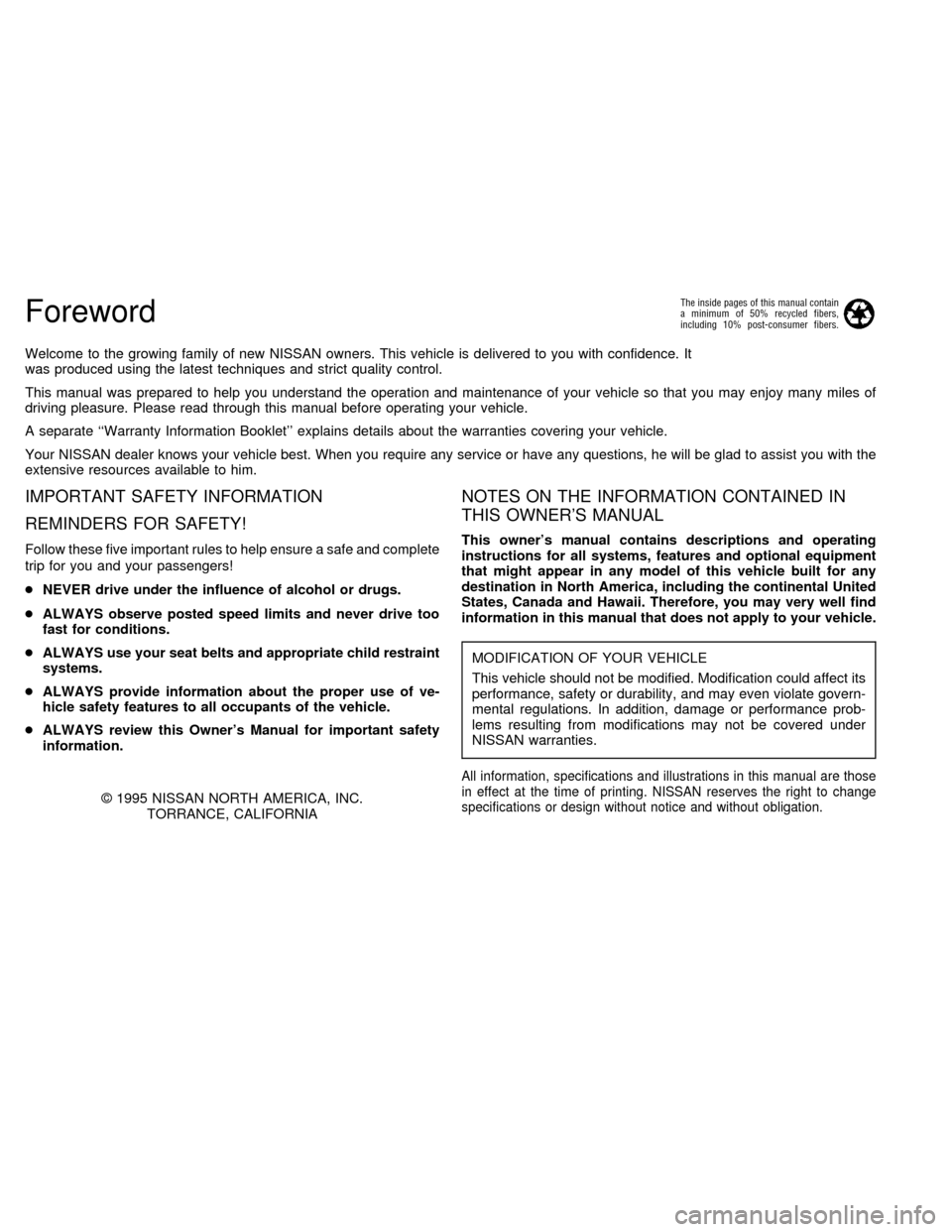
Foreword
Welcome to the growing family of new NISSAN owners. This vehicle is delivered to you with confidence. It
was produced using the latest techniques and strict quality control.
This manual was prepared to help you understand the operation and maintenance of your vehicle so that you may enjoy many miles of
driving pleasure. Please read through this manual before operating your vehicle.
A separate ``Warranty Information Booklet'' explains details about the warranties covering your vehicle.
Your NISSAN dealer knows your vehicle best. When you require any service or have any questions, he will be glad to assist you with the
extensive resources available to him.
IMPORTANT SAFETY INFORMATION
REMINDERS FOR SAFETY!
Follow these five important rules to help ensure a safe and complete
trip for you and your passengers!
cNEVER drive under the influence of alcohol or drugs.
cALWAYS observe posted speed limits and never drive too
fast for conditions.
cALWAYS use your seat belts and appropriate child restraint
systems.
cALWAYS provide information about the proper use of ve-
hicle safety features to all occupants of the vehicle.
cALWAYS review this Owner's Manual for important safety
information.
1995 NISSAN NORTH AMERICA, INC.
TORRANCE, CALIFORNIA
NOTES ON THE INFORMATION CONTAINED IN
THIS OWNER'S MANUAL
This owner's manual contains descriptions and operating
instructions for all systems, features and optional equipment
that might appear in any model of this vehicle built for any
destination in North America, including the continental United
States, Canada and Hawaii. Therefore, you may very well find
information in this manual that does not apply to your vehicle.
MODIFICATION OF YOUR VEHICLE
This vehicle should not be modified. Modification could affect its
performance, safety or durability, and may even violate govern-
mental regulations. In addition, damage or performance prob-
lems resulting from modifications may not be covered under
NISSAN warranties.
All information, specifications and illustrations in this manual are those
in effect at the time of printing. NISSAN reserves the right to change
specifications or design without notice and without obligation.
The inside pages of this manual contain
a minimum of 50% recycled fibers,
including 10% post-consumer fibers.
ZX
Page 26 of 183

2 Pre-driving checks and adjustments
Key ....................................................................... 2-2
Door locks ............................................................ 2-2
Hood release ........................................................ 2-5
Glove box ............................................................. 2-5
Trunk lid lock operation ........................................ 2-6
Fuel filler lid lock operation .................................. 2-7
Front seats ........................................................... 2-9
Rear seat ............................................................ 2-11
Supplemental restraint system (air bag system). 2-12
Warning labels.................................................... 2-15
Air bag warning light .......................................... 2-16
Seat belts ........................................................... 2-17
Child restraints for infants and small children.... 2-23
Tilting steering wheel ......................................... 2-30
Outside mirror remote control ............................ 2-30
Outside mirrors ................................................... 2-30
Inside mirror ....................................................... 2-31
Vanity mirror (If so equipped) ............................ 2-31
ZX
Page 38 of 183
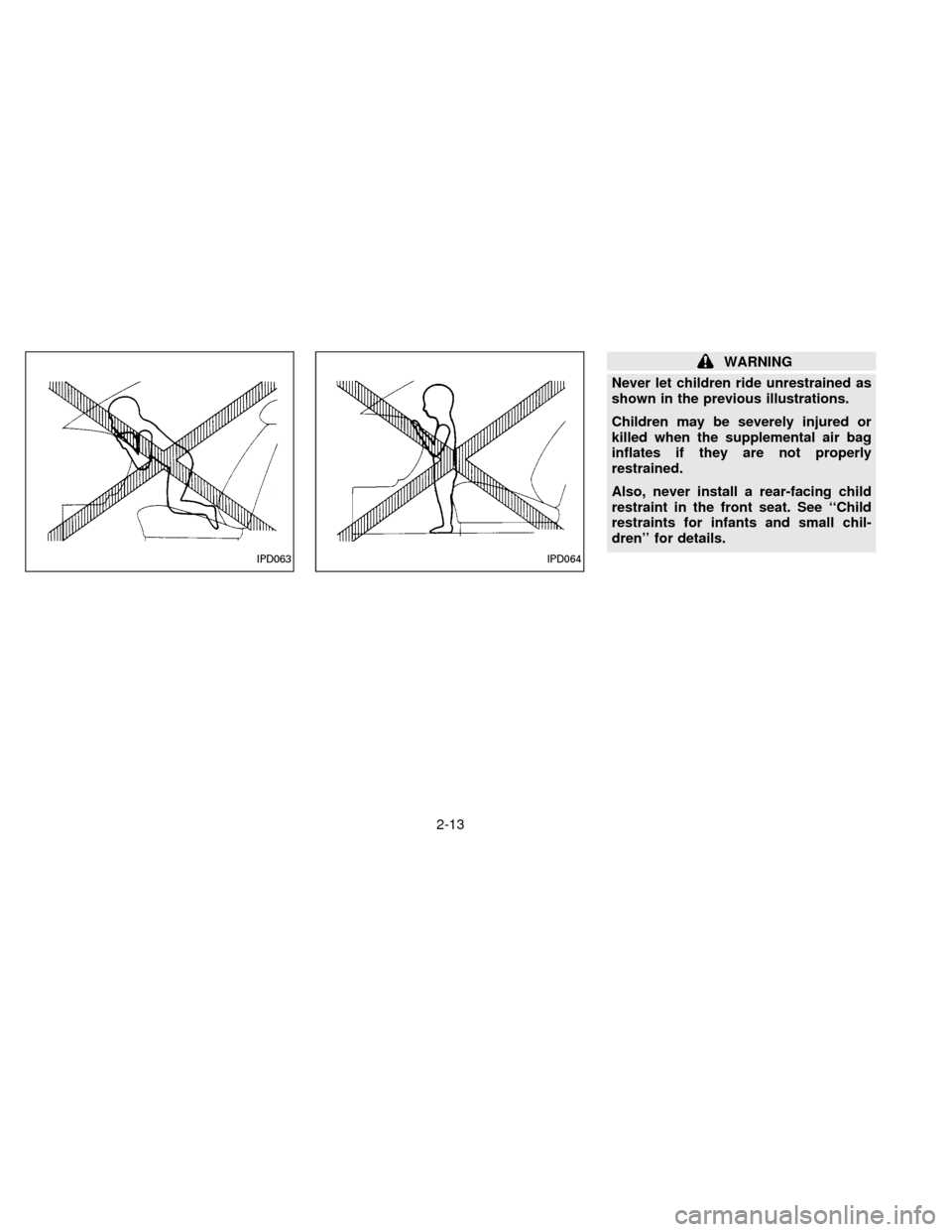
WARNING
Never let children ride unrestrained as
shown in the previous illustrations.
Children may be severely injured or
killed when the supplemental air bag
inflates if they are not properly
restrained.
Also, never install a rear-facing child
restraint in the front seat. See ``Child
restraints for infants and small chil-
dren'' for details.
IPD063IPD064
2-13
ZX
Page 42 of 183
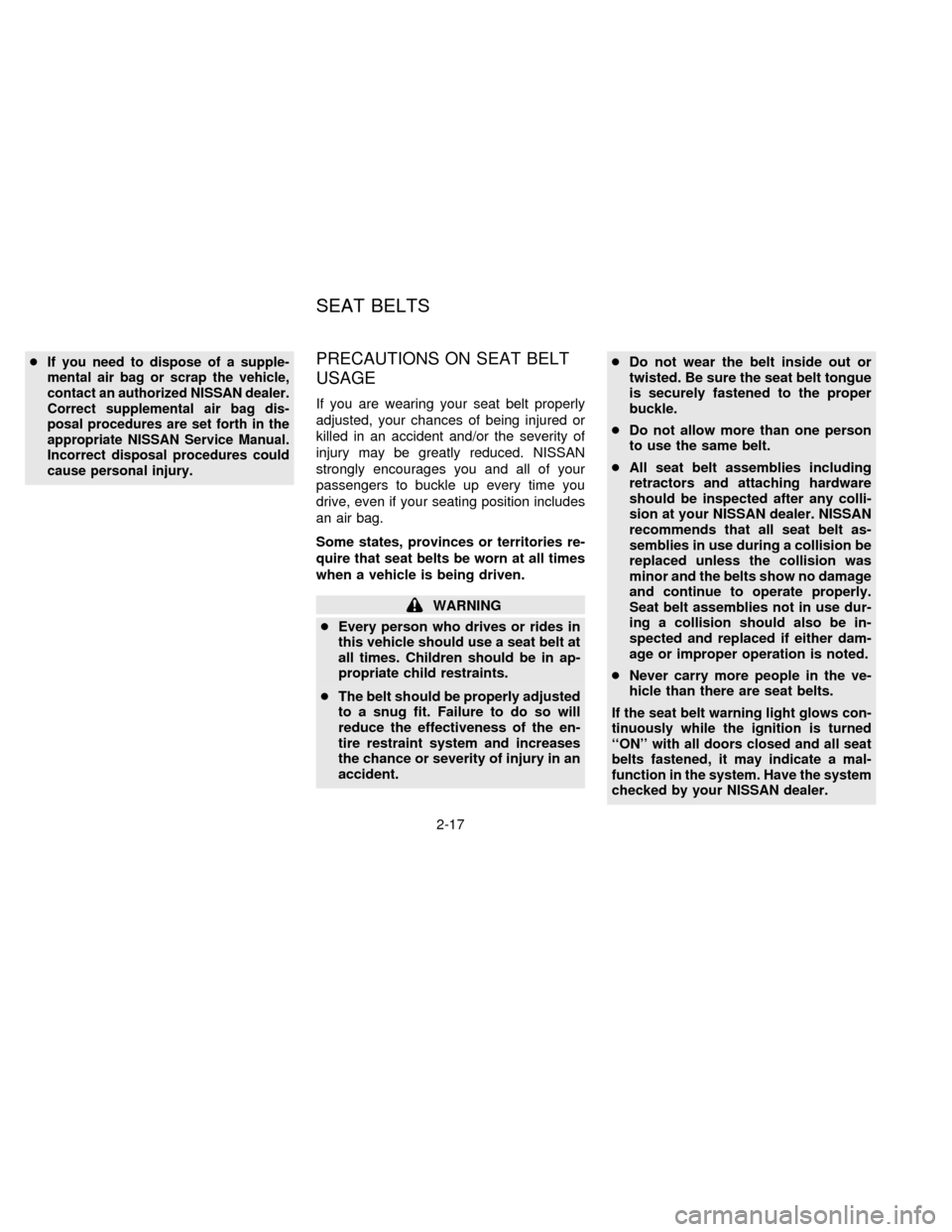
cIf you need to dispose of a supple-
mental air bag or scrap the vehicle,
contact an authorized NISSAN dealer.
Correct supplemental air bag dis-
posal procedures are set forth in the
appropriate NISSAN Service Manual.
Incorrect disposal procedures could
cause personal injury.PRECAUTIONS ON SEAT BELT
USAGE
If you are wearing your seat belt properly
adjusted, your chances of being injured or
killed in an accident and/or the severity of
injury may be greatly reduced. NISSAN
strongly encourages you and all of your
passengers to buckle up every time you
drive, even if your seating position includes
an air bag.
Some states, provinces or territories re-
quire that seat belts be worn at all times
when a vehicle is being driven.
WARNING
cEvery person who drives or rides in
this vehicle should use a seat belt at
all times. Children should be in ap-
propriate child restraints.
cThe belt should be properly adjusted
to a snug fit. Failure to do so will
reduce the effectiveness of the en-
tire restraint system and increases
the chance or severity of injury in an
accident.cDo not wear the belt inside out or
twisted. Be sure the seat belt tongue
is securely fastened to the proper
buckle.
cDo not allow more than one person
to use the same belt.
cAll seat belt assemblies including
retractors and attaching hardware
should be inspected after any colli-
sion at your NISSAN dealer. NISSAN
recommends that all seat belt as-
semblies in use during a collision be
replaced unless the collision was
minor and the belts show no damage
and continue to operate properly.
Seat belt assemblies not in use dur-
ing a collision should also be in-
spected and replaced if either dam-
age or improper operation is noted.
cNever carry more people in the ve-
hicle than there are seat belts.
If the seat belt warning light glows con-
tinuously while the ignition is turned
``ON'' with all doors closed and all seat
belts fastened, it may indicate a mal-
function in the system. Have the system
checked by your NISSAN dealer.
SEAT BELTS
2-17
ZX
Page 43 of 183
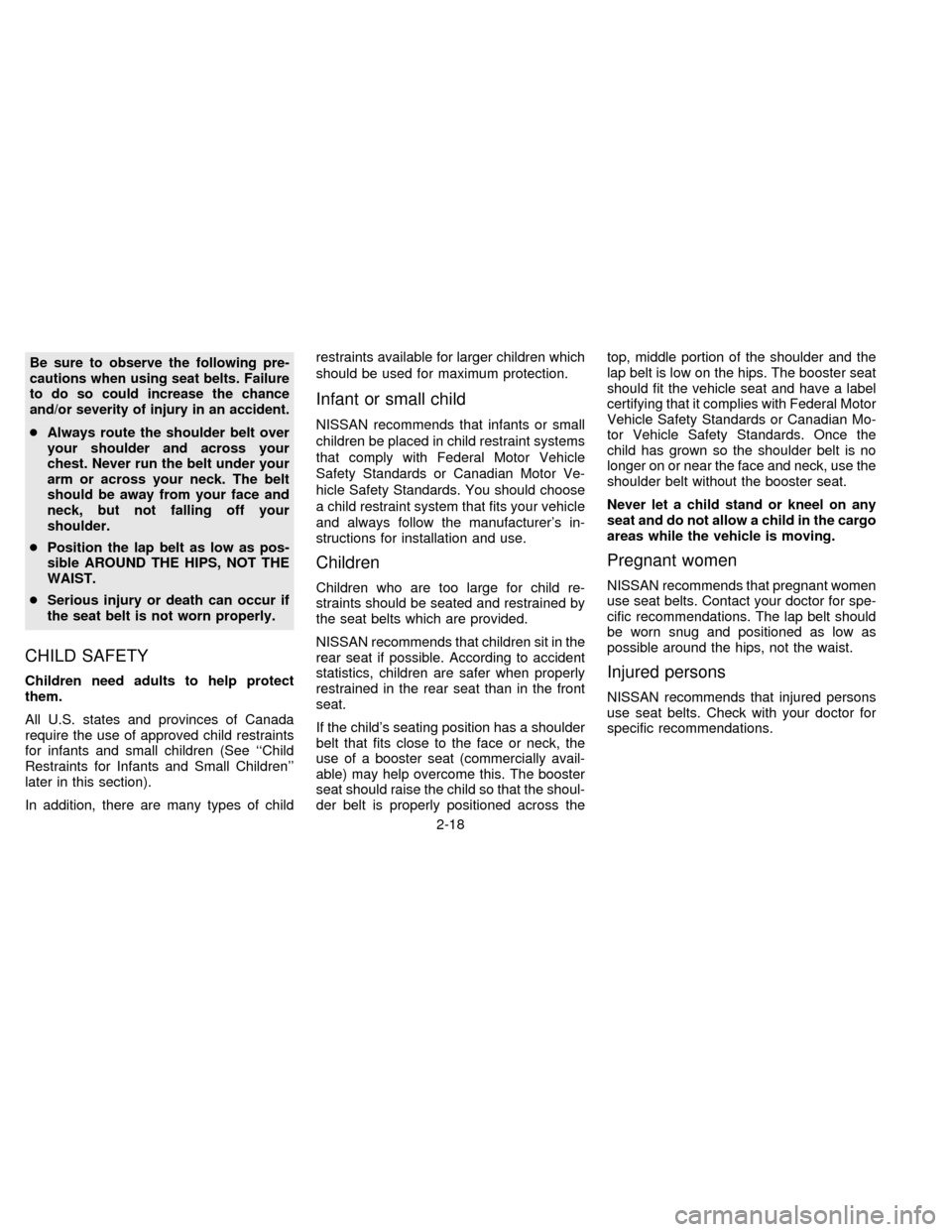
Be sure to observe the following pre-
cautions when using seat belts. Failure
to do so could increase the chance
and/or severity of injury in an accident.
cAlways route the shoulder belt over
your shoulder and across your
chest. Never run the belt under your
arm or across your neck. The belt
should be away from your face and
neck, but not falling off your
shoulder.
cPosition the lap belt as low as pos-
sible AROUND THE HIPS, NOT THE
WAIST.
cSerious injury or death can occur if
the seat belt is not worn properly.
CHILD SAFETY
Children need adults to help protect
them.
All U.S. states and provinces of Canada
require the use of approved child restraints
for infants and small children (See ``Child
Restraints for Infants and Small Children''
later in this section).
In addition, there are many types of childrestraints available for larger children which
should be used for maximum protection.
Infant or small child
NISSAN recommends that infants or small
children be placed in child restraint systems
that comply with Federal Motor Vehicle
Safety Standards or Canadian Motor Ve-
hicle Safety Standards. You should choose
a child restraint system that fits your vehicle
and always follow the manufacturer's in-
structions for installation and use.
Children
Children who are too large for child re-
straints should be seated and restrained by
the seat belts which are provided.
NISSAN recommends that children sit in the
rear seat if possible. According to accident
statistics, children are safer when properly
restrained in the rear seat than in the front
seat.
If the child's seating position has a shoulder
belt that fits close to the face or neck, the
use of a booster seat (commercially avail-
able) may help overcome this. The booster
seat should raise the child so that the shoul-
der belt is properly positioned across thetop, middle portion of the shoulder and the
lap belt is low on the hips. The booster seat
should fit the vehicle seat and have a label
certifying that it complies with Federal Motor
Vehicle Safety Standards or Canadian Mo-
tor Vehicle Safety Standards. Once the
child has grown so the shoulder belt is no
longer on or near the face and neck, use the
shoulder belt without the booster seat.
Never let a child stand or kneel on any
seat and do not allow a child in the cargo
areas while the vehicle is moving.
Pregnant women
NISSAN recommends that pregnant women
use seat belts. Contact your doctor for spe-
cific recommendations. The lap belt should
be worn snug and positioned as low as
possible around the hips, not the waist.
Injured persons
NISSAN recommends that injured persons
use seat belts. Check with your doctor for
specific recommendations.
2-18
ZX
Page 45 of 183
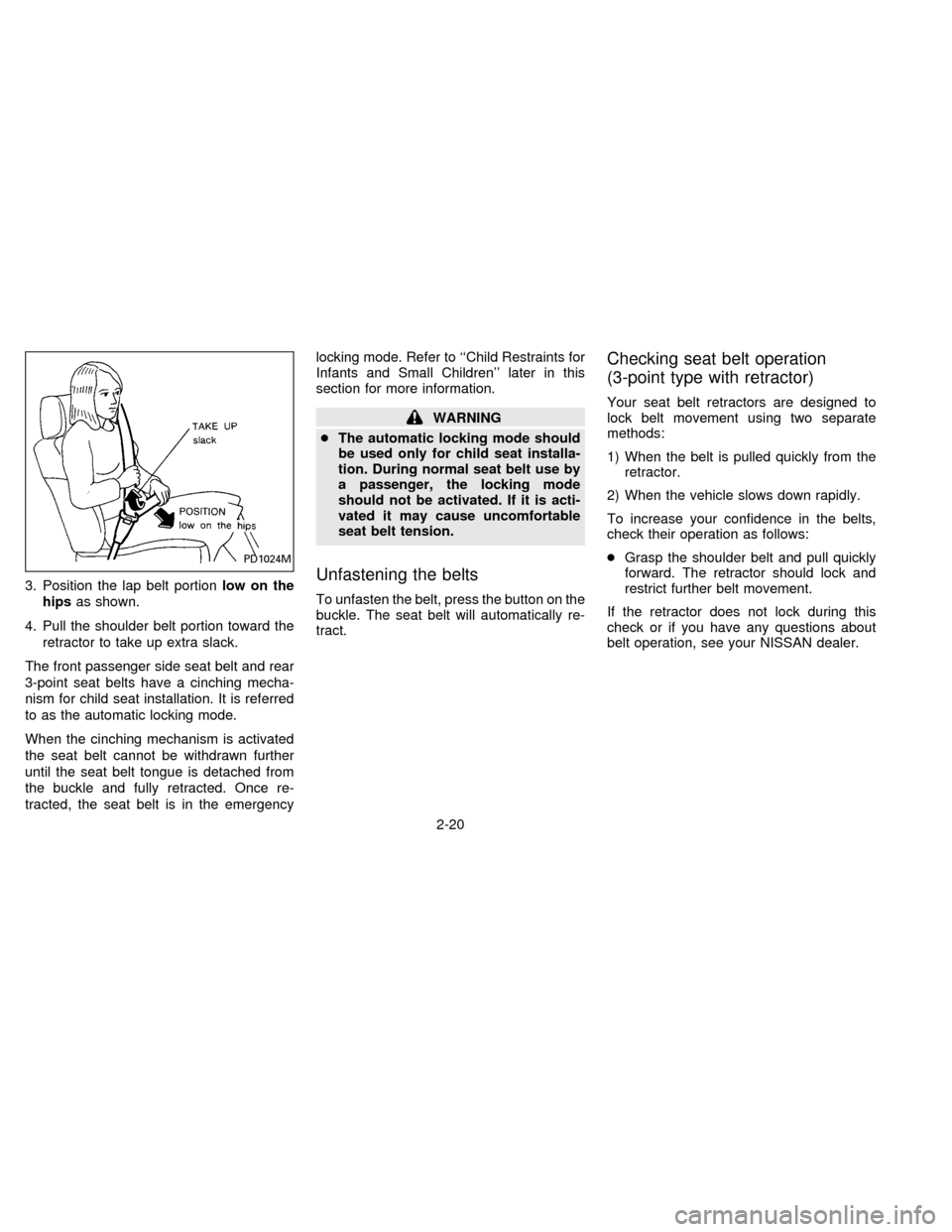
3. Position the lap belt portionlow on the
hipsas shown.
4. Pull the shoulder belt portion toward the
retractor to take up extra slack.
The front passenger side seat belt and rear
3-point seat belts have a cinching mecha-
nism for child seat installation. It is referred
to as the automatic locking mode.
When the cinching mechanism is activated
the seat belt cannot be withdrawn further
until the seat belt tongue is detached from
the buckle and fully retracted. Once re-
tracted, the seat belt is in the emergencylocking mode. Refer to ``Child Restraints for
Infants and Small Children'' later in this
section for more information.
WARNING
cThe automatic locking mode should
be used only for child seat installa-
tion. During normal seat belt use by
a passenger, the locking mode
should not be activated. If it is acti-
vated it may cause uncomfortable
seat belt tension.
Unfastening the belts
To unfasten the belt, press the button on the
buckle. The seat belt will automatically re-
tract.
Checking seat belt operation
(3-point type with retractor)
Your seat belt retractors are designed to
lock belt movement using two separate
methods:
1) When the belt is pulled quickly from the
retractor.
2) When the vehicle slows down rapidly.
To increase your confidence in the belts,
check their operation as follows:
cGrasp the shoulder belt and pull quickly
forward. The retractor should lock and
restrict further belt movement.
If the retractor does not lock during this
check or if you have any questions about
belt operation, see your NISSAN dealer.
PD1024M
2-20
ZX
Page 48 of 183

SEAT BELT EXTENDERS
If, because of body size or driving position,
it is not possible to properly fit the lap-
shoulder belt and fasten it, an extender is
available which is compatible with the in-
stalled seat belts. The extender adds ap-
proximately 8 inches (200 mm) of length
and may be used for either the driver or front
passenger seating position. See your NIS-
SAN dealer for assistance if the extender is
required.
WARNING
cOnly NISSAN belt extenders, made
by the same company which made
the original equipment belts, should
be used with NISSAN belts.
cPersons who can use the standard
seat belt should not use an extender.
Such unnecessary use could result
in serious personal injury in the
event of an accident.
SEAT BELT MAINTENANCE
cTo clean the belt webbings,apply a
mild soap solution or any solution recom-
mended for cleaning upholstery or car-
pets. Then brush the webbing, wipe it
with a cloth and allow it to dry in the
shade. Do not allow the belts to retract
until they are completely dry.
cPeriodically check to see that the belt
and the metal componentssuch as
buckles, tongues, retractors, flexible
wires and anchors work properly. If loose
parts, deterioration, cuts or other dam-
age on the webbing is found, the entire
belt assembly should be replaced.
WARNING
Infants and small children should al-
ways be placed in an appropriate child
restraint while riding in the vehicle.
Failure to use a child restraint can re-
sult in serious injury or death.
Children and infants should never be
carried on your lap. It is not possible for
even the strongest adult to resist the
forces of a severe accident. The child
could be crushed between the adult
and parts of the vehicle. Also, do not
put the same seat belt around both
your child and yourself. In general,
child restraints are designed to be in-
stalled with a lap belt or the lap portion
of a three-point type seat belt.
Nissan recommends that the child re-
straint be installed in the rear seat.
According to accident statistics, chil-
dren are safer when properly restrained
in the rear seat than in the front seat.
An improperly installed child restraint
could lead to serious injury or death in
an accident.
CHILD RESTRAINTS FOR
INFANTS AND SMALL
CHILDREN
2-23
ZX
Page 49 of 183
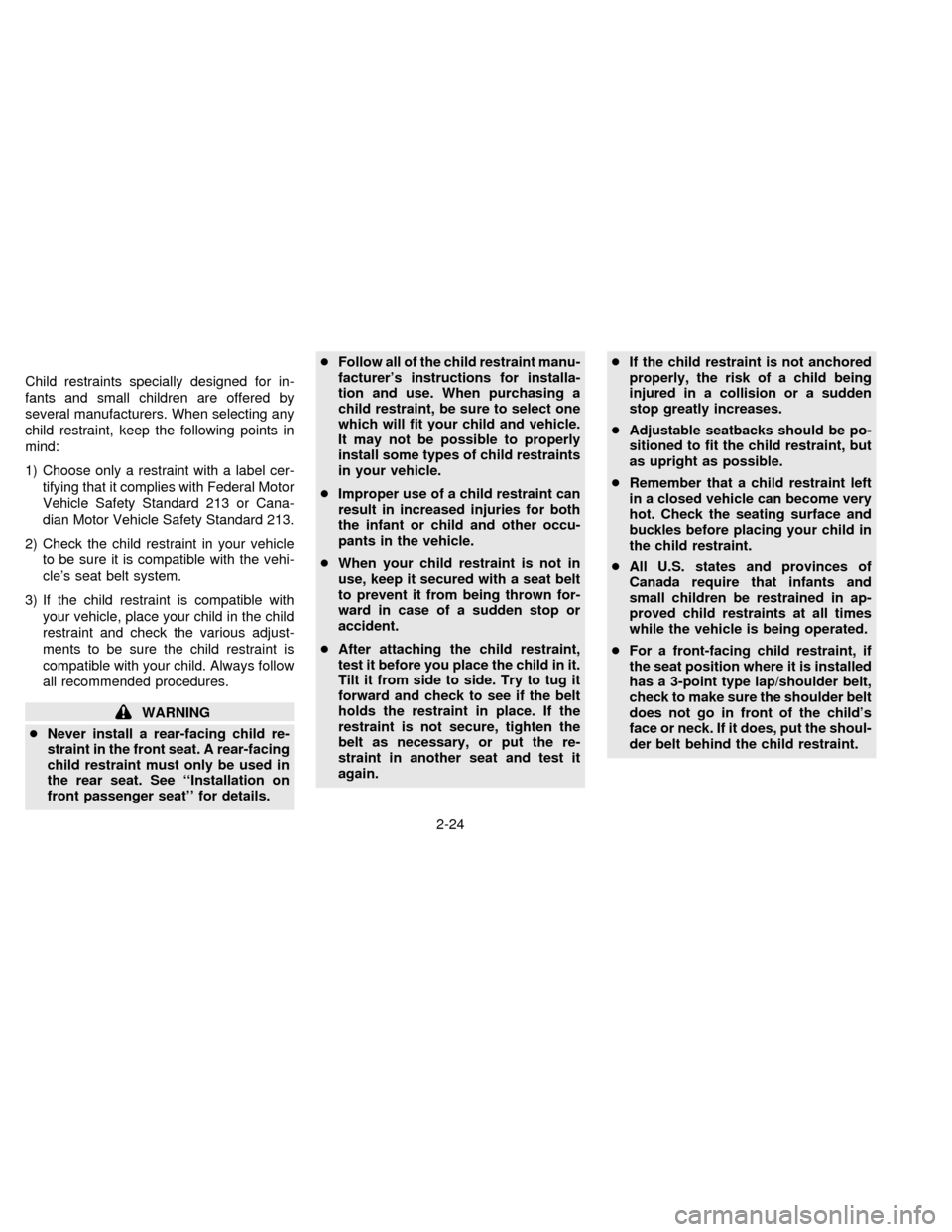
Child restraints specially designed for in-
fants and small children are offered by
several manufacturers. When selecting any
child restraint, keep the following points in
mind:
1) Choose only a restraint with a label cer-
tifying that it complies with Federal Motor
Vehicle Safety Standard 213 or Cana-
dian Motor Vehicle Safety Standard 213.
2) Check the child restraint in your vehicle
to be sure it is compatible with the vehi-
cle's seat belt system.
3) If the child restraint is compatible with
your vehicle, place your child in the child
restraint and check the various adjust-
ments to be sure the child restraint is
compatible with your child. Always follow
all recommended procedures.
WARNING
cNever install a rear-facing child re-
straint in the front seat. A rear-facing
child restraint must only be used in
the rear seat. See ``Installation on
front passenger seat'' for details.cFollow all of the child restraint manu-
facturer's instructions for installa-
tion and use. When purchasing a
child restraint, be sure to select one
which will fit your child and vehicle.
It may not be possible to properly
install some types of child restraints
in your vehicle.
cImproper use of a child restraint can
result in increased injuries for both
the infant or child and other occu-
pants in the vehicle.
cWhen your child restraint is not in
use, keep it secured with a seat belt
to prevent it from being thrown for-
ward in case of a sudden stop or
accident.
cAfter attaching the child restraint,
test it before you place the child in it.
Tilt it from side to side. Try to tug it
forward and check to see if the belt
holds the restraint in place. If the
restraint is not secure, tighten the
belt as necessary, or put the re-
straint in another seat and test it
again.cIf the child restraint is not anchored
properly, the risk of a child being
injured in a collision or a sudden
stop greatly increases.
cAdjustable seatbacks should be po-
sitioned to fit the child restraint, but
as upright as possible.
cRemember that a child restraint left
in a closed vehicle can become very
hot. Check the seating surface and
buckles before placing your child in
the child restraint.
cAll U.S. states and provinces of
Canada require that infants and
small children be restrained in ap-
proved child restraints at all times
while the vehicle is being operated.
cFor a front-facing child restraint, if
the seat position where it is installed
has a 3-point type lap/shoulder belt,
check to make sure the shoulder belt
does not go in front of the child's
face or neck. If it does, put the shoul-
der belt behind the child restraint.
2-24
ZX